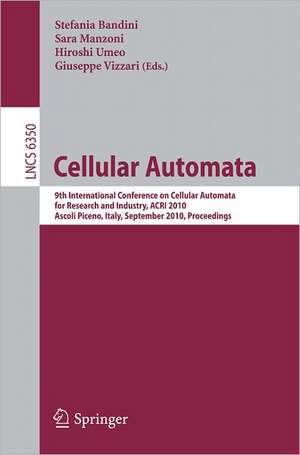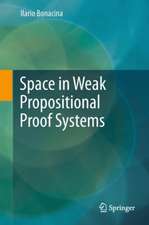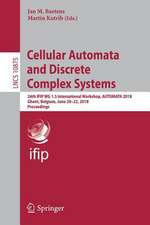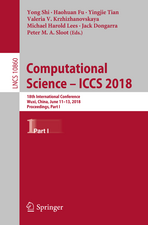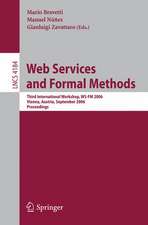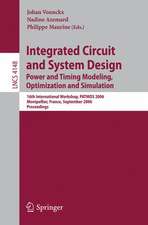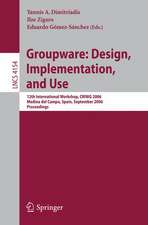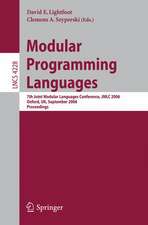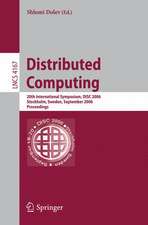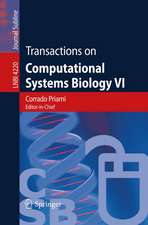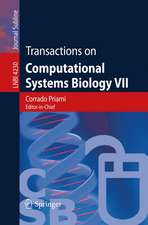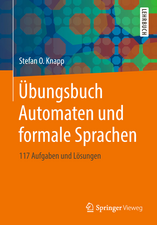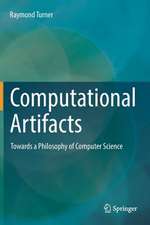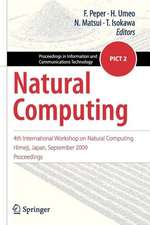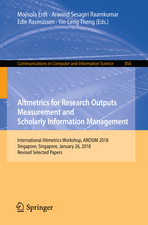Cellular Automata: 9th International Conference on Cellular Automata for Research and Industry, ACRI 2010, Ascoli Piceno, Italy, September 21-24, 2010, Proceedings: Lecture Notes in Computer Science, cartea 6350
Editat de Stefania Bandini, Sara Manzoni, Hiroshi Umeo, Giuseppe Vizzarien Limba Engleză Paperback – 20 sep 2010
Din seria Lecture Notes in Computer Science
- 20%
 Preț: 1061.55 lei
Preț: 1061.55 lei - 20%
 Preț: 307.71 lei
Preț: 307.71 lei - 20%
 Preț: 438.69 lei
Preț: 438.69 lei - 20%
 Preț: 579.30 lei
Preț: 579.30 lei -
 Preț: 410.88 lei
Preț: 410.88 lei - 17%
 Preț: 427.22 lei
Preț: 427.22 lei - 20%
 Preț: 596.46 lei
Preț: 596.46 lei - 15%
 Preț: 448.04 lei
Preț: 448.04 lei - 20%
 Preț: 353.50 lei
Preț: 353.50 lei -
 Preț: 389.49 lei
Preț: 389.49 lei - 20%
 Preț: 309.90 lei
Preț: 309.90 lei - 20%
 Preț: 645.28 lei
Preț: 645.28 lei - 20%
 Preț: 763.23 lei
Preț: 763.23 lei - 15%
 Preț: 580.46 lei
Preț: 580.46 lei - 20%
 Preț: 310.28 lei
Preț: 310.28 lei - 20%
 Preț: 655.02 lei
Preț: 655.02 lei - 20%
 Preț: 1183.14 lei
Preț: 1183.14 lei - 20%
 Preț: 340.32 lei
Preț: 340.32 lei -
 Preț: 449.57 lei
Preț: 449.57 lei - 20%
 Preț: 591.51 lei
Preț: 591.51 lei - 18%
 Preț: 938.83 lei
Preț: 938.83 lei - 20%
 Preț: 337.00 lei
Preț: 337.00 lei - 20%
 Preț: 649.50 lei
Preț: 649.50 lei - 20%
 Preț: 607.40 lei
Preț: 607.40 lei - 20%
 Preț: 1414.79 lei
Preț: 1414.79 lei - 20%
 Preț: 1024.44 lei
Preț: 1024.44 lei - 20%
 Preț: 583.40 lei
Preț: 583.40 lei - 20%
 Preț: 453.32 lei
Preț: 453.32 lei - 20%
 Preț: 575.49 lei
Preț: 575.49 lei - 20%
 Preț: 1075.26 lei
Preț: 1075.26 lei - 20%
 Preț: 585.88 lei
Preț: 585.88 lei - 20%
 Preț: 825.93 lei
Preț: 825.93 lei - 17%
 Preț: 360.20 lei
Preț: 360.20 lei - 20%
 Preț: 763.23 lei
Preț: 763.23 lei - 20%
 Preț: 340.32 lei
Preț: 340.32 lei - 20%
 Preț: 504.58 lei
Preț: 504.58 lei - 20%
 Preț: 369.13 lei
Preț: 369.13 lei - 20%
 Preț: 580.93 lei
Preț: 580.93 lei - 20%
 Preț: 343.62 lei
Preț: 343.62 lei - 20%
 Preț: 350.21 lei
Preț: 350.21 lei - 20%
 Preț: 583.40 lei
Preț: 583.40 lei - 20%
 Preț: 583.40 lei
Preț: 583.40 lei - 15%
 Preț: 438.59 lei
Preț: 438.59 lei - 20%
 Preț: 341.95 lei
Preț: 341.95 lei - 20%
 Preț: 238.01 lei
Preț: 238.01 lei - 20%
 Preț: 538.30 lei
Preț: 538.30 lei
Preț: 664.44 lei
Preț vechi: 830.55 lei
-20% Nou
Puncte Express: 997
Preț estimativ în valută:
127.16€ • 132.26$ • 104.98£
127.16€ • 132.26$ • 104.98£
Carte disponibilă
Livrare economică 24 martie-07 aprilie
Preluare comenzi: 021 569.72.76
Specificații
ISBN-13: 9783642159787
ISBN-10: 3642159788
Pagini: 672
Ilustrații: XVI, 672 p. 332 illus.
Greutate: 0.94 kg
Ediția:2010
Editura: Springer Berlin, Heidelberg
Colecția Springer
Seriile Lecture Notes in Computer Science, Theoretical Computer Science and General Issues
Locul publicării:Berlin, Heidelberg, Germany
ISBN-10: 3642159788
Pagini: 672
Ilustrații: XVI, 672 p. 332 illus.
Greutate: 0.94 kg
Ediția:2010
Editura: Springer Berlin, Heidelberg
Colecția Springer
Seriile Lecture Notes in Computer Science, Theoretical Computer Science and General Issues
Locul publicării:Berlin, Heidelberg, Germany
Public țintă
ResearchCuprins
Theoretical Results on Cellular Automata.- Information Transfer among Coupled Random Boolean Networks.- Open Environment for 2d Lattice-Grain CA.- All-to-All Communication with CA Agents by Active Coloring and Acknowledging.- The Sandpile Model: Parallelization of Efficient Algorithms for Systems with Shared Memory.- Theory and Application of Equal Length Cycle Cellular Automata (ELCCA) for Enzyme Classification.- Cellular Automata Model for Size Segregation of Particles.- Convex Hulls on Cellular Automata.- Square Kufic Pattern Formation by Asynchronous Cellular Automata.- Modeling and Simulation with Cellular Automata.- Development and Calibration of a Preliminary Cellular Automata Model for Snow Avalanches.- Tracking Uncertainty in a Spatially Explicit Susceptible-Infected Epidemic Model.- A Proximal Space Approach for Embedding Urban Geography into CA Models.- Bone Remodelling: A Complex Automata-Based Model Running in BioShape.- CANv2: A Hybrid CA Model by Micro and Macro-dynamics Examples.- Simulation of Traffic Flow at a Signalised Intersection.- A Novel Method for Simulating Cancer Growth.- Towards Cellular Automata Football Models with Mentality Accounting.- The Complexity of Three-Dimensional Critical Avalanches.- Using Cellular Automata on a Graph to Model the Exchanges of Cash and Goods.- Montebello: A Metapopulation Based Model of Carcinogenesis.- CA Dynamics, Control and Synchronization.- Towards Generalized Measures Grasping CA Dynamics.- Synchronization and Control of Cellular Automata.- Discovery by Genetic Algorithm of Cellular Automata Rules for Pattern Reconstruction Task.- Addition of Recurrent Configurations in Chip Firing Games: Finding Minimal Recurrent Configurations with Markov Chains.- A Seven-State Time-Optimum Square Synchronizer.- Codes andCryptography with Cellular Automata.- Null Boundary 90/150 Cellular Automata for Multi-byte Error Correcting Code.- Generating Cryptographically Suitable Non-linear Maximum Length Cellular Automata.- Chaotic Cellular Automata with Cryptographic Application.- d-Monomial Tests of Nonlinear Cellular Automata for Cryptographic Design.- Programmable Cellular Automata (PCA) Based Advanced Encryption Standard (AES) Hardware Architecture.- Exhaustive Evaluation of Radius 2 Toggle Rules for a Variable-Length Cryptographic Cellular Automata-Based Model.- Cellular Automata and Networks.- Network Decontamination with Temporal Immunity by Cellular Automata.- Characterization of CA Rules for SACA Targeting Detection of Faulty Nodes in WSN.- Cellular Automata Applied in Remote Sensing to Implement Contextual Pseudo-fuzzy Classification.- Impact of Coupling of Distributed Denial of Service Attack with Routing on Throughput of Packet Switching Network.- CA-Based Hardware.- A Cellular Automata-Based Modular Lighting System.- Modeling and Programming Asynchronous Automata Networks: The MOCA Approach.- Efficient Circuit Construction in Brownian Cellular Automata Based on a New Building-Block for Delay-Insensitive Circuits.- A Cellular Automaton Controlled Shading for a Building Facade.- FPGA Design of a Cellular Automaton Model for Railway Traffic Flow with GPS Module.- ACA - Int. Workshop on Asynchronous CA.- What Do We Mean by Asynchronous CA? A Reflection on Types and Effects of Asynchronicity.- Parallel Composition of Asynchronous Cellular Automata Simulating Reaction Diffusion Processes.- Comparative Study of Parallel Algorithms for Asynchronous Cellular Automata Simulation on Different Computer Architectures.- Coxeter Groups and Asynchronous Cellular Automata.- Some Formal Properties of Asynchronous Cellular Automata.- A Study on the Automatic Generation of Asynchronous Cellular Automata Rules by Means of Genetic Algorithms.- C&CA - Int. Workshop on Crowds and CA.- Towards Patterns of Comfort: A Multilayered Model Based on Situated Multi-agent Systems.- A Pedestrian Movement Model That Takes into Account the Capacity Drop Phenomenon in the Motion of Crowd.- A Cellular Automaton Model for Crowd Evacuation and Its Auto-Defined Obstacle Avoidance Attribute.- A Learning Algorithm for the Simulation of Pedestrian Flow by Cellular Automata.- On Influencing of a Space Geometry on Dynamics of Some CA Pedestrian Movement Model.- The Dynamic Distance Potential Field in a Situation with Asymmetric Bottleneck Capacities.- Solving the Direction Field for Discrete Agent Motion.- Phase Coexistence in Congested States of Pedestrian Dynamics.- Stochastic Transition Model for Discrete Agent Movements.- Analysis of Obstacle Density Effect on Pedestrian Congestion Based on a One-Dimensional Cellular Automata.- Excluded Volume Effect in a Pedestrian Queue.- T&CA - Int. Workshop on Traffic and CA.- Simulation on Vehicle Emission by the Brake-Light Cellular Automata Model.- Bidirectional Traffic on Microtubules.- Cellular Automata for a Traffic Roundabout.- Cellular Automata for a Cyclic Bus.- Dynamics of a Tagged Particle in the Asymmetric Exclusion Process with Particlewise Disorder.- Chase and Escape in Groups.- A Velocity-Clearance Relation in the Rule-184 Cellular Automaton as a Model of Traffic Flow.- CA and MAS – With the NaSch as Example.- Productivity Enhancement through Lot Size Optimization.- Multilane Single GCA-w Based Expressway Traffic Model.- Properties of Cellular Automaton Model for On-ramp System.- Inversion of Flux between Zipper and Non-ZipperMerging in Highway Traffic.- Clustering and Transport Efficiency in Public Conveyance System.- Clusters in the Helbing’s Improved Model.- Phase Transitions in Cellular Automata for Cargo Transport and Kinetically Constrained Traffic.- A New Computational Methodology Using Infinite and Infinitesimal Numbers.- IWNC - Int. Workshop on Natural Computing.- Molecular Implementations of Cellular Automata.- Achieving Universal Computations on One-Dimensional Cellular Automata.
